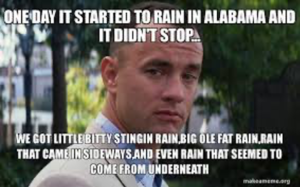While many of you are sitting at home, either with your children who are out of school or out of paranoia and fear over the bat-flu (or, ridiculously, being told you can’t work) one thought keeps recurring in my mind: Does COVID-19 (more commonly known as the Coronavirus) qualify as an “Act of God” under the Force Majeure clause in our clients’ contracts? I know you’re thinking probably thinking:

But if you’ve ever signed a contract—from buying a ticket to a Taylor Swift concert or clicking that “Agree” button after completely not reading Apple’s fourteen pop-up buttons on your MacBook while setting it up, you’ve seen (or not seen and agreed to) a Force Majeure clause.
Force Majeure clauses are fairly boilerplate in many different types of contracts. While they take different shapes and sizes, they all essentially say the same thing: if some random and unanticipated “Act of God” occurs, the responsibilities of the contracting parties may become null and void. “Acts of God” can look like many different things, as defined by this American hero:

A typical list of activities listed in Force Majeure clauses might include:
War, riots, fire, flood, hurricane, typhoon, earthquake, lightning, explosion, strikes, lockouts, slowdowns, prolonged shortage of energy supplies, and acts of state or governmental action prohibiting or impeding any party from performing its respective obligations under the contract.
Nonetheless, as this scary virus is circulating the country and the world, one can only wonder what will happen over the next few weeks and months with thousands, if not millions, of businesses around the world cancelling and breaching contracts due to the Coronavirus, claiming (potentially) that the virus qualifies as an “Act of God” under the Force Majeure provision. A de facto review of the above examples provides no reference to infectious viruses or diseases – meaning that the Coronavirus should not qualify as a “Act of God” under a Force Majeure provision. A de jure review, however, may suggest something quite different – if a higher being (or some power out of the human population’s control) creates an atmosphere, such as a hurricane or a tornado, which makes the carrying out of a party’s duties under the contract impossible or impracticable, then these provisions seem to make some sense and should be enforceable against BOTH parties. Clearly, Kanye West can’t force me to go to his concert in a tornado, and I conversely can’t force him to perform.

The problem still persists, however, in identifying what exactly the Coronavirus is. Is it an “Act of God”, or is it a really-really bad flu that disproportionately effects people 60 and older and those with pre-existing conditions?

Over the past few weeks, local, state, and federal governments around the world have been closing restaurants, bars, public places, and businesses. Some have even issued curfews (first time, I think, since the 1940s) and full-blown lockdowns. But the question remains: before official governmental acts were passed and signed into law, whether permanently or temporarily, can a business or individual preemptively cancel or breach a contract based on the hysteria and fear over the Coronavirus? I would implore that the answer is a resounding no.
If the answer is no, then a party is left with essentially two other options under traditional contract law: (1) that the contract is impracticable to carry out due to the Coronavirus or (2) the fundamental purpose of the contract has been frustrated. Both of these excuses are very difficult to prove, potentially leaving the parties with no way out.
So, while today you are most likely worrying about how much longer your child’s school is going to stay closed, or how much money you’re going to have to pay the government when we eventually have to pay taxes, you should instead be asking yourself: what do your contracts say? Have you ever taken a look at those Force Majeure clauses? Did someone preemptively breach or cancel a contract with you or your business before any official governmental acts?
Don’t let the Corona-craziness ruin your business and your year.




